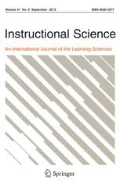Abstract
This paper describes a novel instructional model for sequencing, syntheizing, and summarizing subject-matter content. The importance of such models is discussed, along with the need for a significant change in the role of subject-matter structure in instruction. A “zoom-lens” analogy is presented to facilitate an understanding of the elaboration model of instruction. Some basic concepts and principles upon which the model is based are described. The basic unvarying components of the elaboration model are described. And finally, some variations in the model for different kinds of goals are described. The elaboration model follows a general-to-detailed pattern of sequencing, as opposed to the hierarchically based sequences derived from Gagné-type task analyses.
Similar content being viewed by others
References
Ausubel, D. P. (1963). Meaningful Verbal Learning. New York: Grune and Stratton.
Ausubel, D. P. (1968). Educational Psychology. New York: Holt, Rinehart and Winston.
Crothers, E. J. (1972). “Memory Structure and the Recall of Discourse,” in J. B.Carroll and R. O.Freedle, eds., Language Comprehension and the Acquisition of Knowledge. New York: Wiley.
Darlington, R. B. (1975). Radicals and Squares: Statistical Methods for the Behavioral Sciences. Ithaca, NY: Logan Hill Press.
Gagné, R. M. (1968). “Learning hierarchies,” Educational Psychologist, 6: 1–9.
Gagné, R. M. (1977). The Conditions of Learning, 3rd ed. New York: Holt, Rinehart and Winston.
Merrill, M. D. (1977). “Content analysis via concept elaboration theory,” Journal of Instructional Development, 1(1): 10–13.
Merrill, M. D. (1979). “Elaboration Theory and Cognitive Theory.” Paper presented at the annual convention of the Association for Educational Communications and Technology in New Orleans.
Merrill, M. D., Reigeluth, C. M. and Faust, G. W. (1979). “The Instructional Quality Profile: A Curriculum Evaluation and Design Tool,” in H. F. O'Neill, Jr., Procedures for Instructional Systems Development. New York: Academic Press.
Merrill, P. F. (1978). “Hierarchical and information processing task analysis: A comparison,” Journal of Instructional Development, 1(2): 35–40.
Pask, G. (1975). Conversation Cognition, and Learning. Amsterdam: Elsevier.
Reigeluth, C. M. (1979). “TICCIT to the Future: Advances in Instructional Theory for CAI.” Journal of Computer Based Education, 6: 40–46.
Reigeluth, C. M. (1979). “In search of a better way to organize instruction: The elaboration theory,” Journal of Instructional Development, 2(3): 8–15.
Reigeluth, C. M., Bunderson, C. V. and Merrill, M. D. (1978). “What is the design science of instruction?” Journal of Instructional Development, 1(2): 11–16.
Reigeluth, C. M. and Merrill, M. D. (1978). “A knowledge base for improving our methods of instruction,” Educational Psychologist, 13: 57–70.
Reigeluth, C. M. and Merrill, M. D. (1979). “Classes of instructional variables,” Educational Technology, March: 5–24.
Reigeluth, C. M., Merrill, M. D. and Bunderson, C. V. (1978) “The structure of subject-matter content and its instructional design implications,” Instructional Science, 7: 107–126.
Reigeluth, C. M. and Rodgers, C. A. (1980). “The elaboration theory of instruction: Prescriptions for task analysis and design,” NSPI Journal 19: 16–26.
Shavelson, R. (1974). “Methods for examining representations of a science subject-matter structure in a student's memory,” Journal of Research in Science Teaching, 11: 231–249.
Simon, H. A. (1969). The Sciences of the Artificial. Cambridge, Mass.: M.I.T. Press.
Snelbecker, G. E. (1974). Learning Theory, Instructional Theory, and Psychoeducational Design. New York: McGraw-Hill.
Author information
Authors and Affiliations
Additional information
Many of the ideas described in this paper were developed under two projeets, one funded by Brigham Young University in Provo, Utah, and the other by the Navy Personnel Research and Development Center in San Diego, California; however, the ideas expressed do not necessarily constitute the opinions of the funding institutions.
Rights and permissions
About this article
Cite this article
Reigeluth, C.M., Merrill, M.D., Wilson, B.G. et al. The elaboration theory of instruction: A model for sequencing and synthesizing instruction. Instr Sci 9, 195–219 (1980). https://doi.org/10.1007/BF00177327
Issue Date:
DOI: https://doi.org/10.1007/BF00177327




